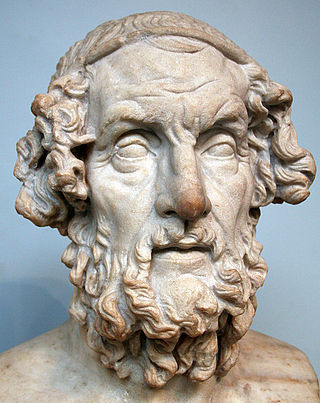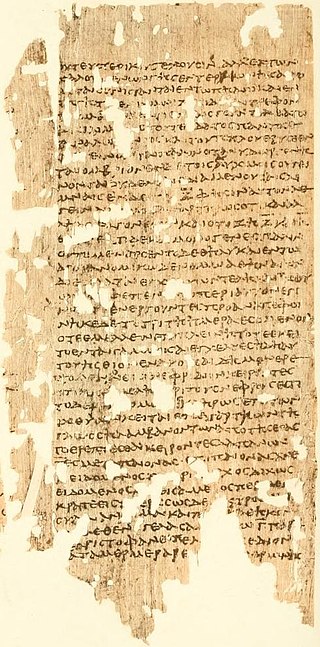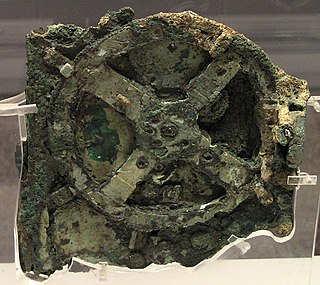Related Research Articles
Dionysius Thrax was a Greek grammarian and a pupil of Aristarchus of Samothrace. He was long considered to be the author of the earliest grammatical text on the Greek language, one that was used as a standard manual for perhaps some 1,500 years, and which was until recently regarded as the groundwork of the entire Western grammatical tradition.

Homer was a Greek poet who is credited as the author of the Iliad and the Odyssey, two epic poems that are foundational works of ancient Greek literature. Homer is considered one of the most revered and influential authors in history.

The Great Library of Alexandria in Alexandria, Egypt, was one of the largest and most significant libraries of the ancient world. The library was part of a larger research institution called the Mouseion, which was dedicated to the Muses, the nine goddesses of the arts. The idea of a universal library in Alexandria may have been proposed by Demetrius of Phalerum, an exiled Athenian statesman living in Alexandria, to Ptolemy I Soter, who may have established plans for the Library, but the Library itself was probably not built until the reign of his son Ptolemy II Philadelphus. The Library quickly acquired many papyrus scrolls, owing largely to the Ptolemaic kings' aggressive and well-funded policies for procuring texts. It is unknown precisely how many scrolls were housed at any given time, but estimates range from 40,000 to 400,000 at its height.
Linguistics is the scientific study of language, involving analysis of language form, language meaning, and language in context.
Didymus Chalcenterus, was an Ancient Greek scholar and grammarian who flourished in the time of Cicero and Augustus.

Classical Latin is the form of Literary Latin recognized as a literary standard by writers of the late Roman Republic and early Roman Empire. It was used from 75 BC to the 3rd century AD, when it developed into Late Latin. In some later periods, it was regarded as good or proper Latin, with following versions viewed as debased, degenerate, or corrupted. The word Latin is now understood by default to mean "Classical Latin"; for example, modern Latin textbooks almost exclusively teach Classical Latin.
Apollonius of Rhodes was an ancient Greek author, best known for the Argonautica, an epic poem about Jason and the Argonauts and their quest for the Golden Fleece. The poem is one of the few extant examples of the epic genre and it was both innovative and influential, providing Ptolemaic Egypt with a "cultural mnemonic" or national "archive of images", and offering the Latin poets Virgil and Gaius Valerius Flaccus a model for their own epics. His other poems, which survive only in small fragments, concerned the beginnings or foundations of cities, such as Alexandria and Cnidus places of interest to the Ptolemies, whom he served as a scholar and librarian at the Library of Alexandria. A literary dispute with Callimachus, another Alexandrian librarian/poet, is a topic much discussed by modern scholars since it is thought to give some insight into their poetry, although there is very little evidence that there ever was such a dispute between the two men. In fact almost nothing at all is known about Apollonius and even his connection with Rhodes is a matter for speculation. Once considered a mere imitator of Homer, and therefore a failure as a poet, his reputation has been enhanced by recent studies, with an emphasis on the special characteristics of Hellenistic poets as scholarly heirs of a long literary tradition writing at a unique time in history.
Grammarian may refer to:
Zenodotus was a Greek grammarian, literary critic, Homeric scholar, and the first librarian of the Library of Alexandria. A native of Ephesus and a pupil of Philitas of Cos, he lived during the reigns of the first two Ptolemies, and was at the height of his reputation about 280 BC.
Apollodorus of Athens son of Asclepiades, was a Greek scholar, historian, and grammarian. He was a pupil of Diogenes of Babylon, Panaetius the Stoic, and the grammarian Aristarchus of Samothrace, under whom he appears to have studied together with his contemporary Dionysius Thrax. He left Alexandria around 146 BC, most likely for Pergamon, and eventually settled in Athens.

The Epic Cycle was a collection of Ancient Greek epic poems, composed in dactylic hexameter and related to the story of the Trojan War, including the Cypria, the Aethiopis, the so-called Little Iliad, the Iliupersis, the Nostoi, and the Telegony. Scholars sometimes include the two Homeric epics, the Iliad and the Odyssey, among the poems of the Epic Cycle, but the term is more often used to specify the non-Homeric poems as distinct from the Homeric ones.
Aristarchus of Samothrace was an ancient Greek grammarian, noted as the most influential of all scholars of Homeric poetry. He was the head librarian of the Library of Alexandria and seems to have succeeded his teacher Aristophanes of Byzantium in that role.
Aristophanes of Byzantium was a Hellenistic Greek scholar, critic and grammarian, particularly renowned for his work in Homeric scholarship, but also for work on other classical authors such as Pindar and Hesiod. Born in Byzantium about 257 BC, he soon moved to Alexandria and studied under Zenodotus, Callimachus, and Dionysius Iambus. He succeeded Eratosthenes as head librarian of the Library of Alexandria at the age of sixty. He died at age 77 of what Athenaeus described as a "retention of urine".

The Mouseionof Alexandria, which arguably included the Library of Alexandria, was an institution said to have been founded by Ptolemy I Soter and his son Ptolemy II Philadelphus. Originally, the word mouseion meant any place that was dedicated to the Muses, often related to the study of music or poetry, but later associated with sites of learning such as Plato's Academy and Aristotle's Lyceum.

Homeric scholarship is the study of any Homeric topic, especially the two large surviving epics, the Iliad and Odyssey. It is currently part of the academic discipline of classical studies. The subject is one of the oldest in education.

Ancient Greek astronomy is the astronomy written in the Greek language during classical antiquity. Greek astronomy is understood to include the Ancient Greek, Hellenistic, Greco-Roman, and late antique eras. It is not limited geographically to Greece or to ethnic Greeks, as the Greek language had become the language of scholarship throughout the Hellenistic world following the conquests of Alexander. This phase of Greek astronomy is also known as Hellenistic astronomy, while the pre-Hellenistic phase is known as Classical Greek astronomy. During the Hellenistic and Roman periods, many of the Greek and non-Greek astronomers working in the Greek tradition studied at the Museum and the Library of Alexandria in Ptolemaic Egypt.

The Library of Pergamum is an ancient Greek building in Pergamon, Anatolia, today located nearby the modern town of Bergama, in the İzmir Province of western Turkey. It was one of the most important libraries in the ancient world.

Philitas of Cos, sometimes spelled Philetas, was a Greek scholar, poet and grammarian during the early Hellenistic period of ancient Greece. He is regarded as the founder of the Hellenistic school of poetry, which flourished in Alexandria after about 323 BC. Philitas is also reputed to have been the tutor of Ptolemy II Philadelphus and the poet Theocritus. He was thin and frail; Athenaeus later caricatured him as an academic so consumed by his studies that he wasted away and died.
References
- Cruttwell, Charles Thomas (1877). "A History of Roman Literature: From the Earliest Period to the Death of Marcus Aurelius". Archived from the original on 2008-12-02. Retrieved 2008-03-30.
- Forbes, P. B. R. (July 1933). "Greek Pioneers in Philology and Grammar". The Classical Review. Cambridge University Press. 47 (3): 105–112. doi:10.1017/s0009840x00062028. JSTOR 699069. S2CID 161911026.
- Frede, Michael (1987). "The Origins of Traditional Grammar". Essays in Ancient Philosophy . U. of Minnesota Press. pp. 338–359. ISBN 978-0-8166-1275-8.
- Harris, Roy (1981). The Language Myth. London: Duckworth.
- Thogmartin, Clyde (February 1984). "Tense, Aspect, and Context in French Narrative". The French Review. 57 (3): 344–349. JSTOR 392746.